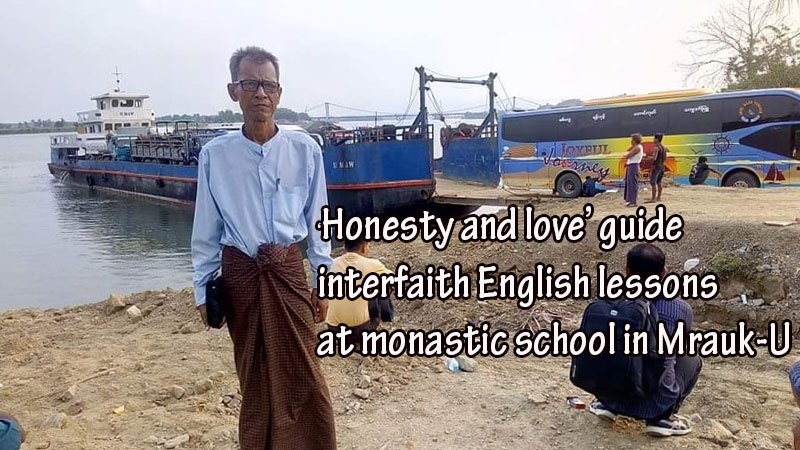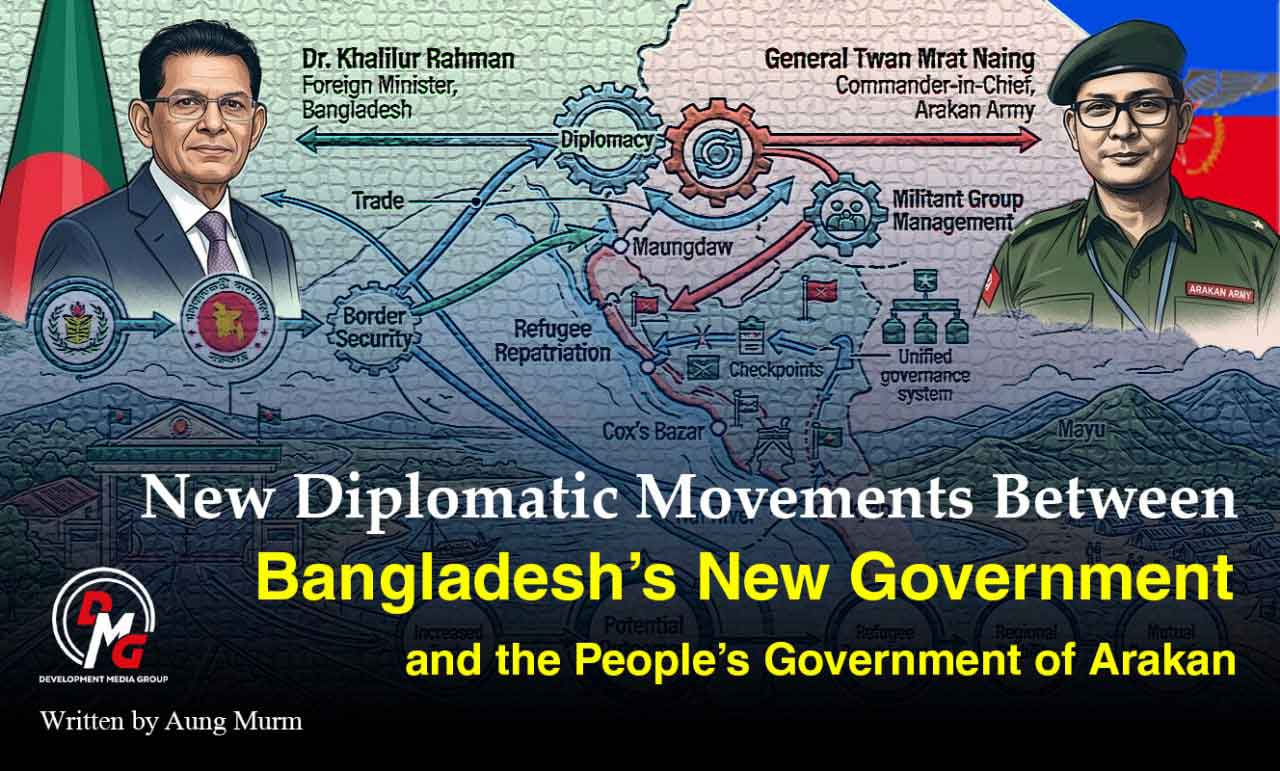- Muslim armed groups killed 162 civilians in two years in northern Arakan: HDCO report
- Arakanese migrants in Middle East on high alert amid escalating Iran conflict
- People with disabilities in Arakan State face severe livelihood hardships amid ongoing conflict
- Junta launches major offensive to retake strategic Mawchi mining town
- Extreme poverty drives Sittwe residents to dismantle abandoned houses for income
‘Honesty and love’ guide interfaith English lessons at monastic school in Mrauk-U
DMG recently interviewed U Aung Khin, a Muslim teacher of English whose students attend classes at the Mratazaung monastic education school in Mrauk-U Township. The interfaith classroom dynamics are not to be taken for granted in Arakan State, where a history of sometimes fraught relations between Buddhists and Muslims is well documented.
23 Nov 2021

DMG recently interviewed U Aung Khin, a Muslim teacher of English whose students attend classes at the Mratazaung monastic education school in Mrauk-U Township. The interfaith classroom dynamics are not to be taken for granted in Arakan State, where a history of sometimes fraught relations between Buddhists and Muslims is well documented.
DMG: How did you become a teacher at Mratazaung monastic education school?
U Aung Khin: The abbot of Mratazaung monastic education school is a well-known Buddhist monk who is doing charity work in Mrauk-U, Minbya and Kyauktaw townships. I have been in contact with the abbot for the past two years because he is a very good-natured and loving monk connecting the two main ethnic groups in Arakan State, Arakanese and Muslim.
The abbot of Mratazaung monastic education school contacted me again in mid-September this year. I came here because the abbot of Mratazaung monastic education school in Mrauk-U told me that the school needed a teacher to teach English 4 skills to children in Arakan State who have passed the matriculation examination.
DMG: What are the main reasons for teaching English?
UAK: As a political observer, I am pleased that the main reason for teaching English to children is that the Arakan Army (AA) will treat all people in Arakan State equally, regardless of race or ethnicity, since the ethnic armed group set up strongholds in Arakan State two years ago. Now that the situation in Arakan State is changing, I have decided to return from Yangon and do my best to achieve harmony with both communities. That’s why I teach English to children at Mratazaung monastic education school.
DMG: The students you teach are from where in Arakan State? What is the total number of students?
UAK: Among the students are some who passed the matriculation exams from IDP families in Mrauk-U Township, and five from Phadu village in Pauktaw Township. I teach English to 18 students. I also teach English to children who have not passed the matriculation examination. Classes are held Monday through Friday from 8 a.m. to 10 a.m. and from 2 p.m. to 4 p.m.
DMG: Where did you go to school? Where did you study English?
UAK: I went to a middle school in Moleik ward in Sittwe. I started studying [English] in Grade 6 at BEHS [Basic Education High School] No. 6 in Kyaung Gyi ward in Sittwe after I passed Grade 5. At the time, I was very poor at English. Since Grade 6, I studied with good English teachers in Sittwe and I was able to write English essays by Grade 9.
DMG: You have previously published translated articles and translated books. What kind of books did you mainly translate?
UAK: The first book I translated, in 2010, was entitled Politics Is Here at a time of democratic transition in Myanmar. I published another translation of the book entitled 26 Countries in Asia in 2014. As my third translation, I published a book entitled The 10 ASEAN Countries. I also published a translation of a book entitled European Countries and a translation of the book Myanmar Police Force. I am currently translating a book about Malala Yousafzai into Myanmar. I have translated more than 10,000 long articles and short stories for journals.
DMG: Do you teach English at Mratazaung monastic education school for a salary or free of charge?
UAK: The abbot of Mratazaung monastic education school teaches students free of charge. However, the abbot is very generous and provides me with K400,000 a month.
DMG: Are there any religious differences between students and teachers in teaching?
UAK: There are no religious differences between teachers and students. Since the students are mainly interested in writing, I mainly teach English to them. If the teacher is honest and loving, the students will automatically have respect for the teacher. I have no problems with teaching.
DMG: Where else are you planning to teach English?
UAK: I have a plan to teach English to students from Minbya and Mrauk-U townships who passed the matriculation examination together with the abbot of Mratazaung monastic education school.
DMG: DMG would like to express a special thanks to you for taking the time to answer our questions.








.jpg)











